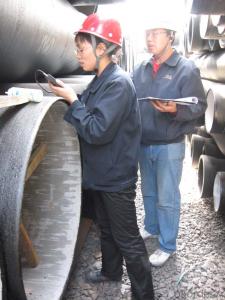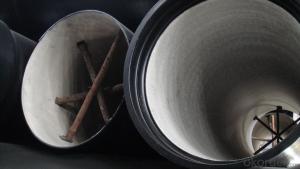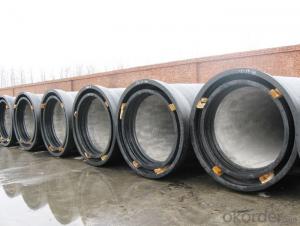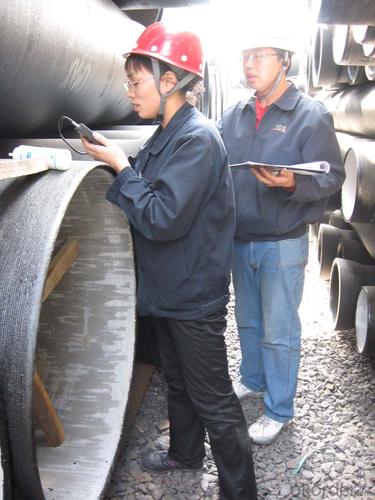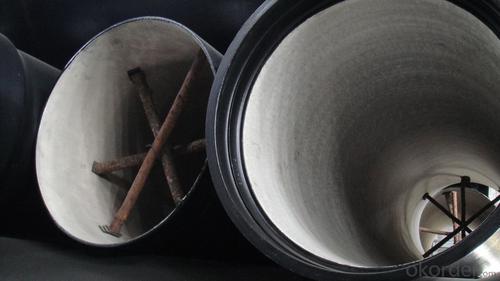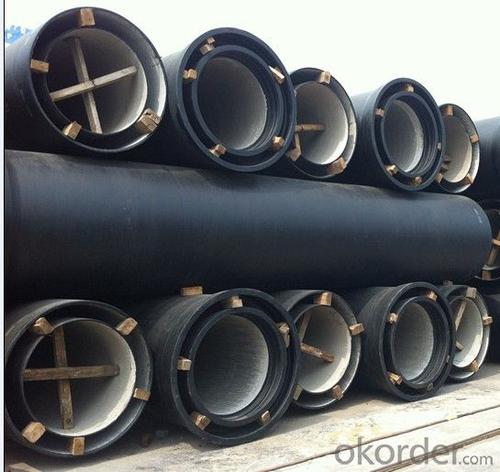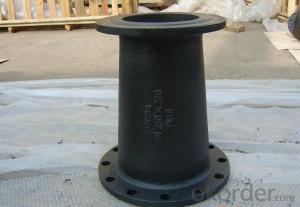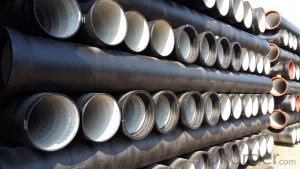Ductile Iron Pipe On Sale Made In China DN350
- Loading Port:
- Tianjin
- Payment Terms:
- TT OR LC
- Min Order Qty:
- 1000 m
- Supply Capability:
- 10000 m/month
OKorder Service Pledge
OKorder Financial Service
You Might Also Like
1.Packaging & Delivery
Packaging Detail: | DN80-300 bundled with steel belt ( the bundle size see the product detail part) DN400-1200 are in bulk |
Delivery Detail: | at least 5days for MOQ |
2.Specifications
Ductile iron pipe comply with ISO2531/EN545
1)We are factory
2)Best quality
3)Competive price
4)On time delivery
3.Features:
Facilitating high resistance to loadings, pressure and vacuum with high tensile strength,
Enabling high resistance to corrosion,
Not requiring cathodic protection,
Less operating cost since cast pipes have larger nominal diameter than polyethylene pipes.
Being the best pipe in case of an earthquake, with its ability of resilience and resistance to impacts without deformation,
Long product life, exceeding 50 years,
Preserving the quality of water with healthy interior coating.
4.Applied Standards:
General Design | ISO 2531 |
Internal Lining | ISO 4179 |
External Coating | ISO 8179 |
Polyethylene Coating (Optional) | ISO 8180 |
5.Joint Types:
Push-on Type | TYT Type |
Standard Type |
6. Diameters:
Pipes | Ø80 – Ø1200 mm (L = 6m, and 5.7m) |
Fittings | Ø80 - Ø2200 mm |
7. Wall Thickness:
Pipes | C and K classes |
Fittings | Class K10 - K12 |
8.Test Pressures:
Pipes | for Ø80 - Ø300 mm | 50 bar / 40 bar |
for Ø350 - Ø600 mm | 40 bar / 30 bar | |
for Ø700 - Ø1000 mm | 32 bar / 25 bar | |
for Ø1100 - Ø2600 mm | 25 bar |
Fittings | for Ø40 - Ø300 mm | 25 bar (*) |
for Ø350 - Ø600 mm | 16 bar | |
for Ø700 - Ø2600 mm | 10 bar | |
(*16 bar for fittings with PN10 flanges) | ||
9.Materials:
Pipe | Ductile iron casting, minimum 420 MPa tensile strength |
Internal Lining | Concrete Lining, ISO 4179 |
Socket Internal 10.Lining | 200 micron epoxy coating |
External Coating | 70 micron bitumen coating on 130 gr/m2 zinc coating, ISO 8179 |
Fittings | Ductile iron casting, minimum 420 MPa tensile strength |
Internal Lining | Concrete Lining, ISO 4179 |
External Coating | 70 micron bitumen coating on 130 gr/m2 zinc coating, ISO 8179 |
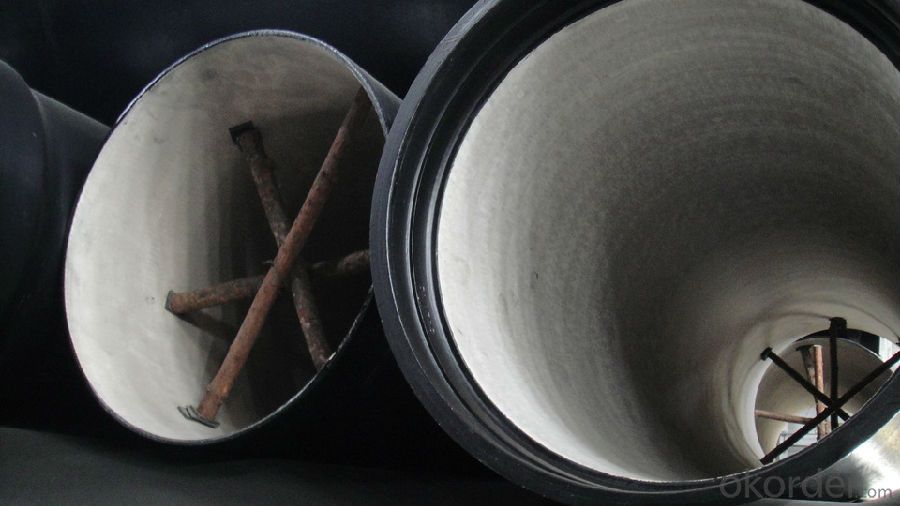
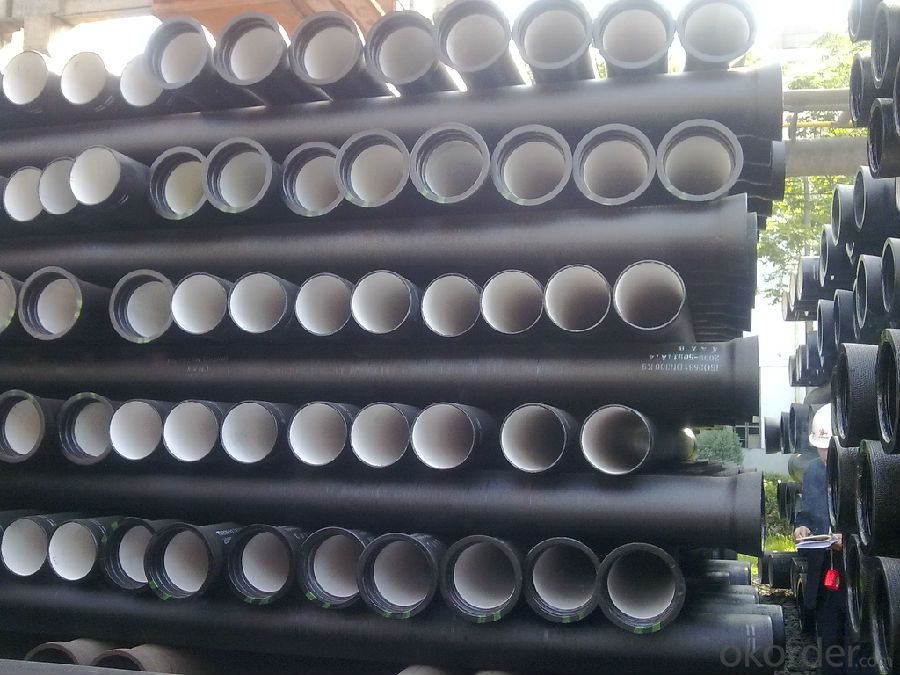
- Q: Fire water supply network adopts ductile iron pipe, the test pressure should be no more than MPa
- Strictly speaking: the outer pipe network and the internal pipe network are the same. Minimum fire 1.0MPa, minimum sprinkler 1.4MPa. Because not only in accordance with the water pump, but also take into account the pressure on the fire engine.
- Q: Are ductile iron pipes suitable for trenchless installation methods?
- Trenchless installation methods can indeed utilize ductile iron pipes effectively. Renowned for their strength, durability, and flexibility, ductile iron pipes prove to be an excellent choice for techniques like horizontal directional drilling (HDD) and pipe bursting. When employing HDD, a small pilot hole is drilled underground, and the ductile iron pipe is subsequently pulled through this hole, eliminating the need for extensive trenching. The robustness of ductile iron pipes allows them to endure the pulling forces exerted during this process while being effortlessly guided along the underground path. Pipe bursting, on the other hand, is another trenchless method that involves breaking apart an existing pipe while simultaneously pulling a new ductile iron pipe into place. Due to their strength and flexibility, ductile iron pipes can withstand the force required to burst the current pipe, resulting in minimal disruption to the surrounding area. Both these trenchless installation methods offer various advantages when ductile iron pipes are used. These pipes possess a high resistance to corrosion and can endure high-pressure applications, making them suitable for a broad range of underground environments. Moreover, their long service life reduces the need for frequent replacement and maintenance. Ultimately, ductile iron pipes emerge as a dependable and appropriate option for trenchless installation methods, presenting efficient and cost-effective solutions for underground pipe installations.
- Q: Can ductile iron pipes be used for underground parking lot drainage?
- Ductile iron pipes are indeed suitable for drainage in underground parking lots. This robust material is frequently utilized in underground piping systems due to its strength and durability. It exhibits exceptional resistance to corrosion, making it an ideal choice for situations where the pipes will come into contact with moisture and water. Furthermore, ductile iron pipes possess considerable tensile strength, enabling them to bear heavy loads and endure the pressure exerted by vehicles in a parking lot. Consequently, opting for ductile iron pipes for underground parking lot drainage ensures a dependable and enduring solution.
- Q: Can ductile iron pipe be used for underground storage tank systems?
- Yes, ductile iron pipe can be used for underground storage tank systems. Ductile iron pipe is known for its durability and strength, making it suitable for various applications, including underground storage tanks. Its high tensile strength and resistance to corrosion make it an ideal choice for containing and transporting liquids or gases in underground environments. Additionally, ductile iron pipe is highly resistant to external pressures and can withstand heavy loads, making it a reliable option for underground storage tank systems.
- Q: What are the different joint types available for ductile iron pipe?
- There are several different joint types available for ductile iron pipe, each with its own advantages and applications. The most common joint types used in ductile iron pipe installations are: 1. Push-on Joint: This joint type is the most widely used and involves a rubber gasket that is placed into a groove on the spigot end of the pipe. The pipe is then pushed into the bell end of the adjoining pipe, creating a watertight seal. Push-on joints are quick and easy to install, making them ideal for applications that require a fast and efficient installation process. 2. Mechanical Joint: This joint type involves the use of a gland and follower gasket that is compressed between the spigot end of one pipe and the bell end of the adjoining pipe. A series of bolts and nuts are used to secure the joint, ensuring a tight and secure connection. Mechanical joints provide a high level of joint integrity and are often used in applications where higher pressures or heavy loads are expected. 3. Flanged Joint: Flanged joints involve the use of flanges on the ends of the pipes, which are then bolted together using gaskets to create a leak-proof connection. Flanged joints are commonly used in applications where the pipe needs to be easily disconnected and reconnected, such as in pump stations or at valve connections. 4. Restrained Joint: Restrained joints are designed to prevent the pipes from separating under high internal pressures or external forces. These joints typically include a mechanical joint with additional restraining devices such as harnesses, rods, or thrust blocks. Restrained joints are commonly used in applications where there is a risk of pipe movement or where stability is critical. It's important to note that the selection of joint type depends on various factors such as the application, operating conditions, and project requirements. Consulting with a professional engineer or pipe manufacturer is recommended to determine the most suitable joint type for a specific ductile iron pipe installation.
- Q: What are some common applications for ductile iron pipe?
- Ductile iron pipe is commonly used in various applications including water and wastewater systems, underground drainage systems, oil and gas pipelines, industrial piping systems, and fire protection systems. Its strength, durability, and resistance to corrosion make it suitable for these applications, ensuring reliable and long-lasting performance.
- Q: Can ductile iron pipes be used for underground wastewater outfalls?
- Yes, ductile iron pipes can be used for underground wastewater outfalls. Ductile iron is a strong and durable material that can withstand the harsh conditions of underground installations, making it suitable for transporting wastewater efficiently and reliably.
- Q: Ductile iron pipes lined with cement mortar in the water (living water, water in the 6.9-7.3) in the early pH, why pH increased? How to solve this problem?
- The basic characteristic of ductile iron pipe of ordinary cement mortar lining the inner wall of the tube will make passivation, have antiseptic effect, but in the initial stage of using cement mortar lining will be the alkali component separation, so that the pH value of water increased to influence water quality
- Q: How do ductile iron pipes perform in high-velocity water flow conditions?
- Ductile iron pipes perform exceptionally well in high-velocity water flow conditions. Due to their unique composition and manufacturing process, ductile iron pipes exhibit superior strength and durability, making them highly resistant to the forces generated by high-velocity water flow. These pipes are specifically designed to withstand significant hydraulic pressure and turbulent conditions. Their inherent ductility allows them to absorb the energy of the flowing water and effectively dissipate any potential stress or impact that may occur. Additionally, the smooth internal surface of ductile iron pipes minimizes frictional losses, enabling efficient water flow even at high velocities. This characteristic is crucial in maintaining the required water pressure and flow rates in applications such as water distribution systems, sewage networks, and industrial processes. Moreover, the corrosion resistance of ductile iron pipes further enhances their performance in high-velocity water flow conditions. These pipes are typically lined with cement mortar or polyethylene, which provides an additional layer of protection against the corrosive effects of fast-flowing water. Overall, ductile iron pipes are well-suited for high-velocity water flow conditions, offering exceptional strength, durability, and hydraulic efficiency. Their ability to withstand the challenges posed by fast-flowing water makes them a reliable choice for a wide range of applications where high water velocity is a concern.
- Q: Can ductile iron pipes be used for river crossings?
- Yes, ductile iron pipes can be used for river crossings. Ductile iron is a strong and durable material that can withstand the stresses and pressures of being installed underground and crossing rivers. It is commonly used in water and sewage systems, including river crossings, due to its resistance to corrosion and its ability to handle high water pressure.
Send your message to us
Ductile Iron Pipe On Sale Made In China DN350
- Loading Port:
- Tianjin
- Payment Terms:
- TT OR LC
- Min Order Qty:
- 1000 m
- Supply Capability:
- 10000 m/month
OKorder Service Pledge
OKorder Financial Service
Similar products
Hot products
Hot Searches
Related keywords
